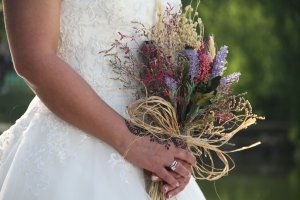Wedding law in England and Wales is badly out of date.
We campaign for marriage to be equally open to all, regardless of religion or belief.
Time for one wedding law for all.
In England and Wales, different laws apply depending on whether a wedding is Anglican, Jewish, Quaker, another religion or not religious at all (a civil wedding or partnership).
This is unfair, confusing and absurd.
Most religious weddings must be held in a registered place of worship, while civil weddings and partnerships must take place in approved premises. Jewish and Quaker weddings can take place anywhere.
This system leads to inequality. Members of religions which don't have fixed places of worship, or don't use their places of worship for weddings, are disadvantaged. And members of nonreligious communities such as Humanism have no way of getting legally married according to their philosophical beliefs.
The process for a place of worship to register itself for marriage is much cheaper than for approved premises for civil ceremonies. This in turn contributes to the cost of civil marriages and partnerships.
Over 80% of opposite-sex marriages in England and Wales in 2019 were civil marriages. But only 16% of recognised wedding venues in England and Wales can hold civil marriages. The remaining 84% are religious venues.
While approved premises for civil weddings and partnerships must by law hold ceremonies for same-sex couples, this is not the case for places of worship. In 2022, only 2% of places of worship were registered for same-sex weddings. This considerably reduces the options for same-sex couples. Whereas opposite-sex weddings are in slow decline, same-sex weddings are increasing.
UPDATE: The Law Commission has now made its final recommendations on reforming wedding law on England and Wales. Please write to your MP in support of the recommendations...
Unregistered religion-only 'marriages'
The complexity of marriage law may contribute to the rise in couples who have religious 'wedding' ceremonies that are not legally-binding.
A signification proportion of Muslim couples are in an Islamic 'nikah' union lacking the full legal rights and protections of a recognised marriage.
Unregistered marriages can undermine women's rights in particular. If a woman in a nikah is 'divorced' suddenly, or against her wishes, she can be left homeless and without any money or assets.
The situation is made worse by sharia councils or 'courts' which dispense religious rulings on Islamic marriage, child custody and divorce. These are not courts of law but there are concerns some Muslim women, especially those not born in the UK or unable to speak English, perceive them as having real legal authority.
Sharia councils leave children vulnerable and discriminate openly against women. To seek a religious divorce a woman must gain permission from these almost entirely male councils, and there are reports of women being denied this request even in cases where they have faced abuse.
Reforming wedding laws will not solve these problems completely. But making wedding laws simpler and fairer can encourage couples to gain the legal protections of a registered marriage.
Take action!
1. Write to your MP
Tell your MP to support the Law Commission's recommendations for wedding reform.
2. Share your story
Tell us why you support this campaign, and how you are personally affected by the issue. You can also let us know if you would like assistance with a particular issue.
3. Join the National Secular Society
Become a member of the National Secular Society today! Together, we can separate religion and state for greater freedom and fairness.
Latest updates
NSS backs plans to allow outdoor weddings permanently
Posted: Tue, 18 Jan 2022 09:13
The National Secular Society has welcomed plans to allow all types of weddings to be held outdoors indefinitely.
The government is consulting on plans to extend temporary measures enacted as a result of the Covid-19 pandemic allowing outdoor civil marriages and civil partnerships.
Under the proposals, outdoor civil ceremonies would be permitted to continue indefinitely, while new laws would also enable places of worship to hold religious weddings outdoors.
Laws in England and Wales only permit weddings to take place indoors at approved premises for civil ceremonies, or places of worship registered for marriage.
The only exception is for Jewish and Quaker weddings, which can be held anywhere.
The proposals would only apply to premises with linked outdoor areas. Venues would still be subject to many requirements in order to register as a premises for weddings.
NSS response
The NSS, which campaigns for greater freedom and equality in marriage law, expressed support for the proposals.
In its response to the consultation, it said the proposals would "significantly increase freedom and fairness for all couples to marry how they want, and where they want – including outdoors".
The NSS said it hoped the proposal would be a "stepping stone" towards adopting broader reforms to wedding law proposed by the Law Commission last January.
Under the commission's proposals, supported by the NSS, restrictions on where weddings can be held would be removed, effectively giving couples of all religions and beliefs the same rights as Jewish and Quaker couples to marry where they wish.
The commission's proposed reforms would mean the legal status of the wedding would be determined by the presiding officiant, not the venue where it is held.
NSS head of policy and research Megan Manson said: "Allowing outdoor marriages will be an important step towards greater freedom and fairness for all couples, regardless of their religion or belief.
"However, the restrictive nature of our archaic wedding laws in England and Wales that tie weddings to buildings will continue to reduce opportunities for many, including same-sex couples and couples belonging to minority religion or belief groups. We therefore urge the government to adopt the proposals outlined by the Law Commission to make our wedding laws fit for the 21st century."
The consultation closes next Monday, January 24th. Responses can be submitted online here.
Image: Ebru Doğru, Pixabay
Wedding reform: “High level of support” across faiths & beliefs
Posted: Tue, 14 Dec 2021 10:21
Proposed reforms to wedding laws have a "high level of support" from people of different religions and beliefs, according to a new study.
The results of the study published in a briefing paper this month found participants regarded wedding laws in England and Wales as "outdated" and "in need of reform" to reflect changes in society, including "religious and cultural diversity".
The study demonstrates broad support for reforms proposed by the Law Commission to wedding laws in England and Wales. The proposals were also backed by the National Secular Society in its response to a consultation by the commission in January.
The paper, whose authors include specialist advisor to the commission's weddings project Professor Rebecca Probert, investigated why wedding ceremonies are conducted outside the legal framework.
The study examined the views of 167 individuals from a variety of religious and non-religious backgrounds who had either participated in, or been involved conducting, different kinds of non-legally binding wedding ceremonies.
In 2014, a study of 50 Muslim women in the West Midlands found that while 46 were in an Islamic 'nikah' marriage, only 5 were in a legally recognised civil marriage. Over half were unaware that they lacked the full legal rights and protections of a legally recognised marriage.
Problems in wedding law
Key issues raised by participants included the perceived lack of recognition of non-Christian ceremonies, the non-recognition of ceremonies conducted by humanists and independent celebrants, and the limited options for interfaith weddings.
These issues result partly from the law in England and Wales which specifies the vast majority of legally recognised weddings can only take place in registered place of worship or approved premises. Only weddings held according to Jewish or Quaker traditions may take place in any setting.
Participants considered these rules "unnecessarily restrictive", especially those who have limited access to a registered place of worship or who wanted to marry outdoors.
The Law Commission proposals, supported by the NSS, would replace the restrictive building-based system with an officiant-based one for the legal recognition of marriage.
An officiant-based system would entail a more inclusive approach to authorising which religious groups can officiate legally recognised weddings, and could include "non-religious belief groups" including humanists. It could also include independent celebrants and would make it easier for couples to hold interfaith weddings.
The proposals found "widespread support" among participants.
Additionally, having weddings on approved premises contributed to the cost of getting married, participants said. Many expressed that having a wider choice of venues by removing restrictions would reduce costs.
The Law Commission has also proposed to lift restrictions on religious content at civil ceremonies. This would mean marrying couples could choose to have a hymn sung or prayer read at their ceremony.
Only one participant expressed concerns that permitted this would "draw away" from the role of religious groups in weddings. Other participants supported the proposals, which are also backed by the NSS.
Many participants also considered the legal processes for getting married to be "complex and uncertain". The Law Commission's proposals aim to simplify many of these aspects, including introducing standardised civil preliminaries.
NSS comment
NSS head of policy and research Megan Manson said: "This study underscores the urgent need for reform of wedding laws in England and Wales to make them simpler, fairer and fitting for the 21st century.
"Participants' views reveal these laws are archaic and cannot accommodate the increasingly irreligious and religiously-diverse society we have today.
"The Law Commission's proposals would make it easier and cheaper for everyone, whatever their religion or belief, to have the wedding that best suits them. The government should embrace these plans to ensure no-one faces unnecessary barriers to marriage."
Notes
- The Law Commission is a statutory independent body, tasked with keeping the law in England and Wales under review and recommending reform where it considers it necessary.
- The NSS campaigns for legally-binding weddings to be equally open to all, regardless of religion or sexual orientation.




